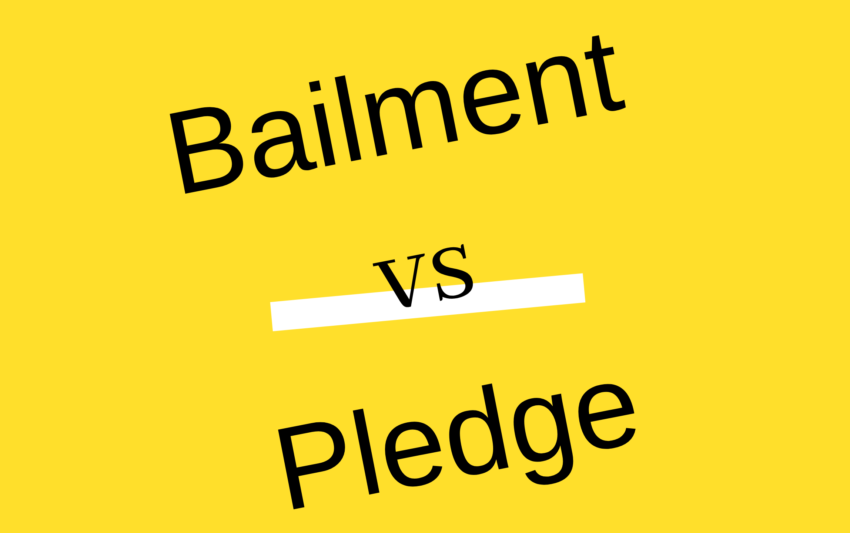
(1) Introduction:
There are many types of contracts covered in the Contract Act, a party may use various types of Contracts, according to the requirement of a business transaction or any other purposes.
The contract of Bailment and Pledge are also covered in the contract, which the party may use for various purposes. Sometimes, this type of contract creates some confusion between them, because of some similarities, we can not find that, what is the difference between a Bailment and a Pledge.
The key difference between Bailment and Pledge is how to use the goods. For example in the case of pledge usage of goods is restricted but in the case of bailment, the owner bailor hands over the goods to the bailee, and he can permit to use of the goods for a specific purpose.
In this article, we discuss the difference between Bailment and Pledge with definition, meaning, purpose, where to use this bailment and pledge contract, and the legal provision of both of them.
(2) Definition of Bailment:
A bailment is one kind of contract that is defined, under section 148 of the Indian Contract Act,1872. When the goods are handed over by one party to another party for a specific purpose of a short period. Here one thing is that the goods are given by bailment in terms of possession only, and it does not transfer the ownership of goods.
In short, without changing ownership of goods, it can be handed over from one party to another party with some limited or specific purpose. Here, the party who delivers the goods is called the bailor, and another party who receives those goods is called the bailee.
After the compliance of the purpose, the receiver bailee shall return the goods to the original owner bailor. Here the goods mean all kinds of moveable items covered in the definition in terms of goods except the money and property.
The bailee who receives goods from the bailor has to be taken care of as his goods, and not make any other use without getting the permission of the bailor except the specified purpose mentioned in the contract.
At the time of delivering the goods, the bailor must have specified the bailee. What the fault, and what purpose of Delivering the doods?
The delivery might be in terms of actual, symbolic, or constructive delivery, depends on the purpose use of goods.
Duties of Bailor:
Here is some duty of a bailor, which should be fulfilled by him.
The bailor is duty-bound to disclose all the faults. Otherwise, he is responsible for the damage or losses caused by the bailee.
The bailor has to pay if any extraordinary expense to the bailee regarding the bailment.
The bailor has to accept the goods after completion of the purpose of the subject matter.
The bailor has to pay the bailee if any loss is sustained by the bailee due to the defective title of the bailor.
Duties of Bailee:
The bailee also has some duties which is given below:
(1) The bailee is responsible for taking care of bailed goods:
It is the duty of the bailee to take proper and responsible care of goods that are bailed to by the bailor. Under Sections 151 and 152 of the contract act, it has specifically mentioned that bailee must be taken care of goods as his goods, with the same value and quantity.
Hans, if bailee takes proper care of bailed goods, then due to many circumstances, he is not liable for any loss or damages.
However, all situations are not in our control like an act of God, natural disaster, etc. In this situation, he agrees to take reasonable care of goods bailed.
(2) Bailee can not use an unauthorized manner of goods:
Here one thing we should note is that bailee can use the goods only for a specific purpose and not to other than that. According to the provision under sections 153 and 154 of the contract act, baile has no right to use goods bailed in an unauthorized manner.
He can not make any unauthorized use. If bailee does so, the bailor has a right to terminate such a bailment contract with bailee as well and he can claim for his damages caution of unauthorized use of goods by bailee.
(3) Keeping the bailed goods in separate:
It is a duty of bailee to keep goods bailed separate from other goods and not to mix up with his own goods, without obtaining the consent of the bailor.
According to the provisions of sections 155,156 and 157, if Bailee mixes such goods with his own goods, then he is liable to bear the cost of separation or in case of loss of such goods. Bailor is entitled to the claim of damages due to mixing up such goods.
(4) Return goods after fulfillment of purpose:
According to sections 160 and 161, It is the duty of the bailee to return goods bailed without demand by the bailor after compliance with the purpose within a time limit. If Bailee does not do so, he is liable for any loss, destruction, deterioration, or damages due to this fault.
(5) Return increase or profit on the goods bailed:
According to section 163, it is the duty of the bailee to return the goods with an increase or profit if any occur, the goods subject to the exemption clause.
Because it accrued from goods, therefore it is part of it. That’s why such type of increase or profit has to be delivered along with bailed goods.
(3) Definition of Pledge:
The Pledge is a type of bailment which defined under section 172 of the contract act,1872. A bailment of a Pledge related to the transfer of goods as security for payment regarding debt, or advance loan, as well as any performance of the promise, etc. it’s known as a Pledge.
Here, a party who pledges goods for security purposes is called a pawnor, and a party who delivers such ledge for security purposes is called a pawnee.
Essential ingredients of Pledge:
- A bailment of a pledge is a Special contract that has some following essential ingredients.
It should be a bailment for security purposes against payment, repayment, or performance of the promise. - The pledge goods should be existence.
- The pledge goods should be delivered, from pawner to pawnee.
- The ownership of pledge goods should not transfer.
Rights of Pawnor:
According to the Contract Act, of 1872, under section 177, which deals with the rights to redeem pawnor. According to the right, if the pawnee sells the pledge goods, without informing through notice to the pawnor in the time limit, then the pawnor has the right to file a suit for redemption of pledged goods upon the debt or promise. This right is given to the pawnor under section 176 of the act.
Rights of Pawnee:
Pawnee has the following rights:
- According to sections 173 and 174, The pledged goods can be retained by the pawnee, not only for the payment of the debt or the performance of the obligation. And also retains those goods for the interest of the debt and for any necessary expenses incurred by the pawnee in respect to the possession or maintenance of the goods.
- According to section 175, Pawnee’s expenses for the protection of the goods pledged can be recovered from Pawnor.
- In the absence of repayment of the debt to Pawnee, Pawnee has two rights: either to begin proceedings against him or to sell the goods. The Pawnee keeps the goods with himself as collateral safety and security in the former situation and initiates the court proceedings. He does not need to give Pawnor any notice of such proceedings.
In the other case, after giving due notice of sale to the Pawnor, the Pawnee can sell the goods. If the money earned from the selling of goods is less than the amount, It is possible to recover the remaining amount from Pawnor. And if the Pawnee gets more than the amount due, this surplus is to be returned to Pawnor.
(4) Difference between Bailment and Pledge (Comparison Chart):
| Basic comparison | bailment | pledge |
| meanings | When the goods are handed over from one party to another party in a temporary period with a specific purpose, it is called a bailment. | When the transfer of goods as security for payment regarding debt, or advance loan, or performance of the promise, etc. it called a Pledge. |
| Defined in the act | It is defined in the Contract Act, of 1872, Under Section 148. | It is defined in the Contract Act, of 1872, Under Section 172. |
| Parties | the party who delivers the goods is called the bailor, and another party who receives those goods is called the bailee. | a party who pledges goods for security purposes is called a pawnor, and a party who delivers such ledge for security purposes it is called a pawnee. |
| Right to use of goods | The owner bailor hands over the goods and he can be permitted to use the goods for a specific purpose. | In the pledge usage of goods is restricted. |
| Right to sell goods | Has no right to sell goods. | Has the right to sell the goods if the borrower becomes a defaulter. |
| Purpose | For the services, repairing, or tasks, etc. | To get the loan, or performance of a contract, etc. |




